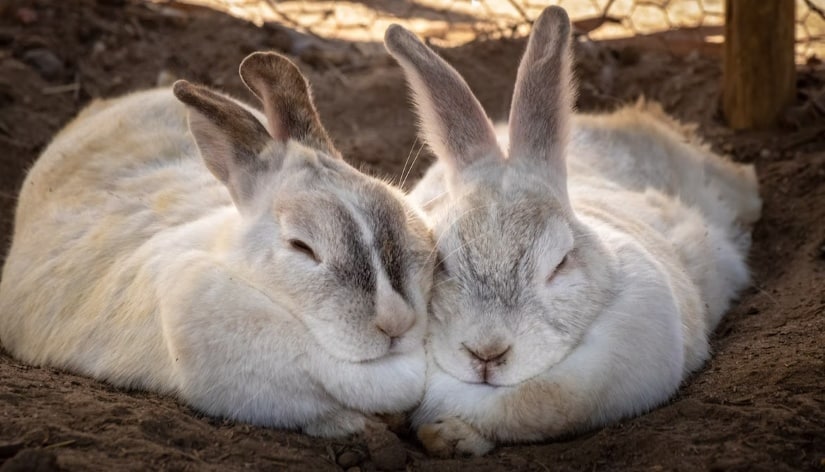When choosing bedding for your rabbit, you need to think beyond the question, “will this bedding reduce odors?” While, yes, it’s very important to pick a bedding or litter that will cut down on ammonia and unpleasant smells, it’s also crucial that the bedding is safe to ingest.
Rabbits love to dig and burrow in their bedding, and they chew everything they can reach. Good bedding for rabbits needs to be nibble-safe, odor-absorbing and dust-free. Rabbits have extremely sensitive respiratory systems, so any dust, mold, added scents, or even natural wood fragrances can lead to serious illness in rabbits.
Rabbit Bedding Red Flags
Never use bedding for your rabbits that contains any one of these things:
- Dusty clay
- Crystalline silicate
- Clumping agents
- Masking fragrances
- Essential Oils
- Softwood phenols
- Fresh hardwood (not dried or processed)
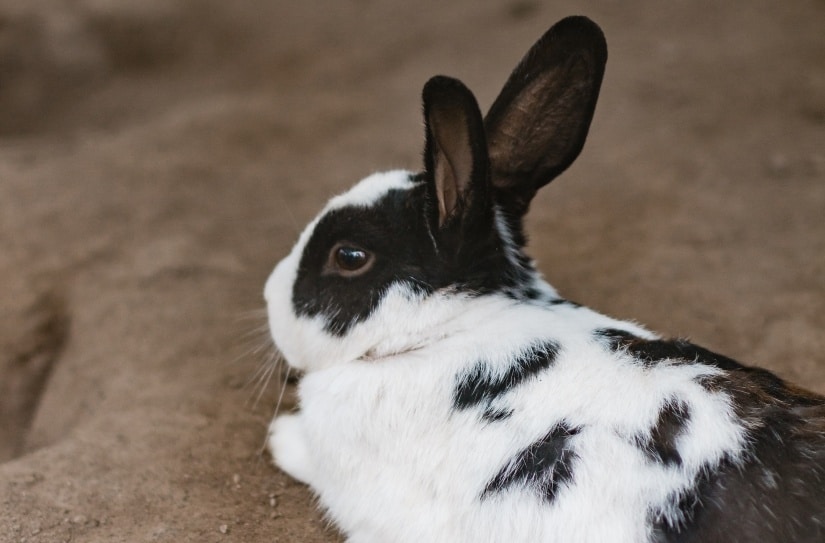
The 9 Worst Bedding Options for Rabbits (These are Dangerous!)
Let’s take a look at 9 common pet bedding or litter products you should never use for your pet rabbit. (Then, don’t worry, we’ll share our favorite safe rabbit bedding choices!)
1. Cedar or Softwood (Pine) Shavings
Using cedar or pine shavings as rabbit bedding is one of the most common mistakes that rabbit owners make. And no wonder – every pet store markets these products to rabbit owners! While cedar or pine shavings are tempting to use because they are affordable and do a good job of masking rabbit smells, they simply aren’t safe.
What’s wrong with cedar or pine shavings? Well, you know that delightful scent they have? Isn’t it great to walk into a room with a cedar chest or walk through a woodshop that just cut some fresh pine and inhale the wood fragrance? Softwood smells wonderful to humans in occasional doses – but imagine living on top of that smell 24 hours a day. And now, imagine if your sense of smell was 15-20 times more acute?
According to this study, rabbits have 100 million olfactory receptors in their noses, while humans have only 6 million. So any strong smell is highly irritating to rabbits. It makes them susceptible to respiratory stress and disease such as pasteurellosis, commonly known as “snuffles”.
Cedar or Pine Shavings and Liver Enzymes
But that’s not all. Both anecdotal evidence in rabbits and scientific studies in rodents show that housing small animals on pine shavings causes elevated enzymes in their livers. The popular belief is that once the body inhales and absorbs the fresh-smelling compounds in softwood – called phenols – the liver has to create additional enzymes to filter them out.
Rabbits whose livers are already working extra hard due to exposure to wood phenols may be at risk of liver damage if placed on medication, anesthesia (for spay/neuter surgery), or other stress. Some vets are also concerned that elevated liver enzymes also cause medications to not function as expected.
2. Fresh Hardwood Shavings
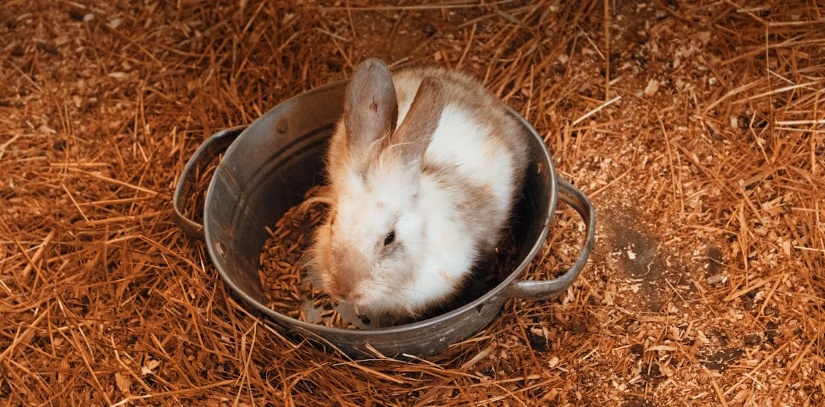
Kiln-dried, heat-treated, and processed hardwood aspen shavings is a safe bedding choice for rabbits. However, you should avoid any raw hardwood shavings. Raw hardwood shavings contain wood oils, scents, phenols, and other compounds that could cause harm to your rabbit – but these are greatly reduced with drying and processing.
Thankfully, pretty much all commercially available aspen shavings sold as pet bedding are dried, heat-treated, and safe to use. As long as you aren’t scooping fresh shavings off a woodshop floor, you’re fine.
3. Loose Sawdust
Although loose sawdust was popular as rabbit bedding once upon a time, we now know it’s not safe for rabbits. Untreated sawdust carries all the same risks as untreated wood shavings – high levels of wood oils, phenols, fragrances – plus the dust factor itself. Loose sawdust is irritating to rabbits’ skin, nasal passages, and lungs. It’s so irritating, in fact, that it’s known to cause cancer! Definitely not something you want to use in your beloved pet’s environment.
There are a number of pet bedding products made of compressed treated sawdust, such as Arm & Hammer “Feline Pine” or Small Pet Select’s Pine Pellet Bedding that may be safe for rabbits. These heat-treated products are low-dust and have reduced fragrance and oil. However, they tend to make a mess when they get wet and can mold more quickly than paper-based beddings, so they aren’t our top choice. (If you use Feline Pine, make sure to get the version with NO baking soda, fragrances, or clumping agents!
4. Scented Bedding (Even Natural Fragrances or Essential Oils)
As we mentioned earlier, rabbits have a powerful sense of smell. Ammonia and nasty pee smell can be dangerous for their respiratory systems. This means you need to change soiled bedding or litter daily for your rabbit’s health.
Trying to avoid frequent cleaning by masking the odor with scented bedding is one of the worst things you can do. Beddings with added fragrances, even this one with natural lavender, add more burden to your rabbit’s liver and respiratory system. (They aren’t very effective at masking the smell, either.)
For rabbits, avoid ALL beddings with added fragrances, whether synthetic or natural essential oils.
5. Untreated Straw
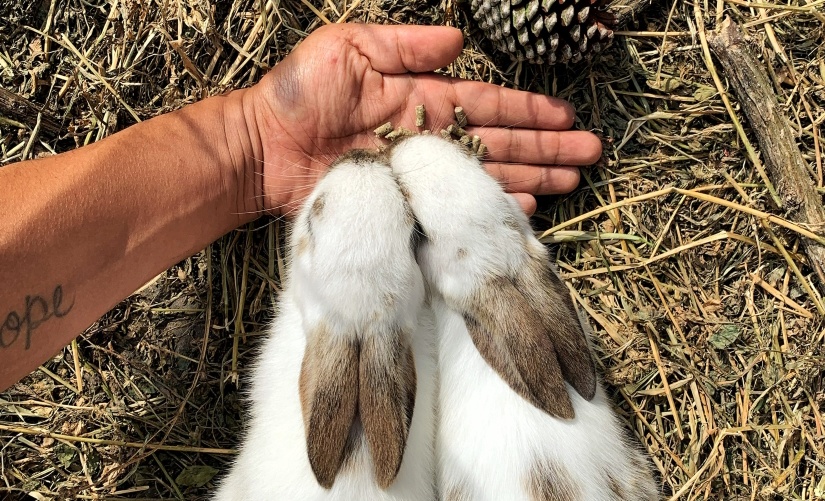
Straw is another popular rabbit bedding. Straw is made from the dried, cut stems of wheat or oat crops. Its hollow strands trap air and are very insulating. For people living in rural areas, straw is often available from local farms in bales for a low cost. Straw is safe for rabbits to eat, although bunnies will usually not eat much of it if they have better-tasting green hay available.
So straw sounds like a great rabbit bedding, right? The issue is that unprocessed straw – the kind you buy in bales from the local farm – has often not been stored properly. The bales may have sat in fields and been rained on, or kept in damp barns. I’ve personally opened several straw bales that looked okay from the outside, but inside they’re moldy and dusty and infested with mites.
Even if the straw is clean when you give it to your rabbits, it degrades very quickly. Straw will start to grow mold or mildew within a day or two if it has been soiled by rabbit pee or droppings. Airborne mycotoxins released by common molds such as Cladosporium, Penicillium, and Aspergillus can cause irritation and allergic reactions in rabbits as well as in humans. Some doctors also believe they can trigger more serious autoimmune conditions.
Because of this mold risk, we don’t recommend using straw for your rabbits that has been stored in bales. A safer option is E-Z straw, which is cleaned and heat-processed before packaging to remove mold or pathogens.
6. Corn Cob Bedding
Bedding made from shredded corn cobs is popular among birdkeepers and other pet enthusiasts, but it’s not safe for rabbits. Like straw, corn cobs mold quickly – but that’s not the biggest risk. Corn cobs have three components – chaff, woody ring, and pith – and they are nearly impossible for rabbits to digest. Your rabbit’s system might be able to handle a little bit at a time. But eating large amounts of corn cobs can cause deadly blockages in your rabbit’s digestive tract.
A healthy rabbit that’s given a suitable diet with plenty of hay probably won’t want to eat much corn cob bedding, but when a rabbit is stressed and doesn’t have hay available, it’ll turn to anything fibrous that it can find. This is when corn cob bedding becomes a risk.
The other downsides of corncob bedding are that it scatters easily and makes a mess in your home. It won’t dry quickly if it’s peed on, potentially leading to mold or toxic levels of ammonia in your rabbit’s litter box.
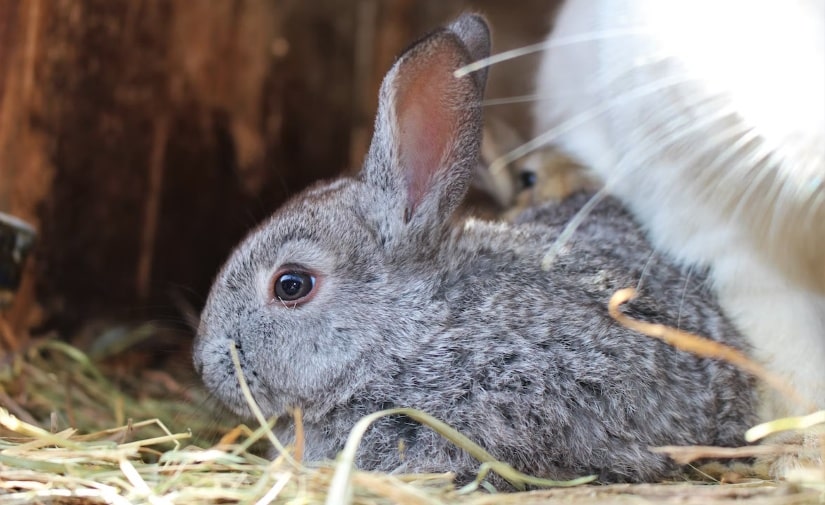
7. Disposable Puppy Pads
Disposable plastic puppy pads are a huge threat to rabbits because bunnies love to scratch, bite, and tear at the slippery material. While most of it will end up shredded and spread around the room, your bunny may swallow some of the plastic. This puts them at risk of life-threatening GI stasis: a condition that occurs when a rabbit’s digestive tract slows to a stop, often caused by an indigestible blockage. Rabbits can’t vomit, so anything that a rabbit eats, it must be able to break down. Indigestible plastic like the kind used in disposable puppy pads has no place in a healthy rabbit cage.
8. Clumping Clay Cat Litter
Clumping clay cat litter is very dangerous for rabbits. This litter is made of bentonite or other volcanic clay and forms solid clumps when exposed to moisture. Clumping litter is safe for cats because they have no interest in eating their litter. But bunnies explore the world by gnawing and nibbling. Can you imagine the risks of eating clumping litter? The clay particles would absorb moisture from your rabbit’s digestive tract and form solid lumps that could kill your bunny. In fact, according to WebMD, bentonite clay can even cause a blockage in humans’ intestines!
Bentonite clay is frequently contaminated with lead or heavy metals. Many clay cat litters, whether clumping or non-clumping, contain irritating dust such as crystalline silica, which is a known carcinogen.
Beware! Clay litter is dangerous whether or not it’s made for cats. Some companies market clay litter for ferrets or “small pets” and put a picture a rabbit on the package, but that doesn’t make it safe. Avoid using clay litter as bedding for rabbits at all costs.
9. Silica Gel Litter
Silica gel litter is made from amorphous silica gel granules. These tiny gel beads absorb liquid, trap odors, and allow moisture to evaporate into the air. It’s another cat care product that is totally unsuitable for bunnies. While silica gel is low-dust and technically isn’t toxic, it’s completely indigestible. Since, as we’ve mentioned, rabbits can’t vomit, silica gel beads pose a serious blockage risk if rabbits eat them.
What is the Best Bedding for Rabbits?
Many animal beddings were created to repurpose the byproducts of various industries. Sawdust, corncob, and straw are all examples of this. These products were created for convenience or cost benefits to the manufacturers, not because they are actually the best for your pet.
So if you want to give your rabbit the best bedding that won’t cause respiratory or digestive problems, what should you choose?
- Shredded Paper. Our favorite bedding for rabbits is an unbleached shredded paper or paper pulp product, such as CareFresh. It’s absorbent, unscented, and digestible for bunnies.
- Clean Straw. If you can source straw that has been cleaned, treated for mites, and properly dried, it’s a good option as long as you change it whenever dirty.
- Aspen Shavings. Wood shavings are a little less absorbent than paper beddings, but they look prettier and rabbits love to play in them. Properly dried aspen shavings make a safe bedding for rabbits, unlike cedar or pine.
Do Rabbits Need Bedding?
Rabbits like to stretch out on a flat surface to sleep – such as your living room floor or the floor of their cages. This contact with a solid surface helps them feel safe because they know they can jump up and run at any alarm. Rabbits are less likely than a cat or dog to use a comfy padded pet bed.
Observing this, many rabbit owners ask, “do rabbits need bedding at all?” While free-ranging house rabbits may not sleep in bedding material, digging or playing in bedding provides an enriching activity. Rabbits that live in solid-floored cages need bedding on the cage floor. It gives them secure footing and absorbs urine.
Conclusion
Rabbits are delicate creatures with a unique set of needs. Many common pet bedding products are toxic or life-threatening to bunnies. Choosing a safe bedding is one of your most important rabbit-care decisions.
Safe rabbit bedding is free of mold, doesn’t clump, and is made of organic material. It’s unscented and safe for rabbits to shred or swallow. If it’s wood-based wood, the wood must be heat-treated to kill pathogens and remove oils or phenol compounds that could cause liver damage in rabbits.
